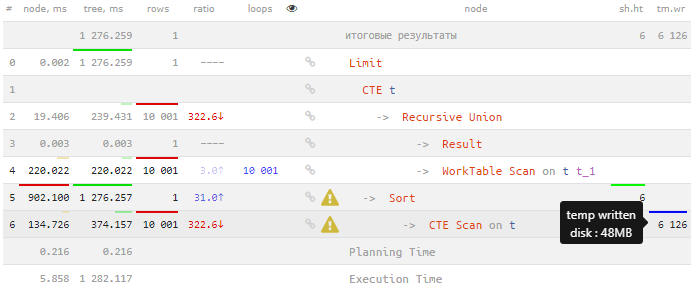Sometimes, when running long or poorly written queries in PostgreSQL, various unpleasant things happen, such as a sudden process crash or a crash of the entire server .
In such cases, "dead souls" may remain on the media - files (sometimes quite large, but quite comparable in size to the rest of the database) that were created during the process as a temporary storage of intermediate data .
This data is no longer needed by anyone, can not be used by anyone, but the server is still in no hurry to get rid of it like Plyushkin.

Today we will see how they can be found and painlessly "cleaned up".
Looking for temp buffers
The first category of problems that arise is the temporary use of disk space during the execution of the plan node, if the required amount of memory does not fit into work_mem .
To get such an effect is quite simple - to forget to set or choose too large a recursion limit :
explain (analyze, buffers)
WITH RECURSIVE T AS (
SELECT
0 i
, '' s
UNION ALL
SELECT
i + 1
, repeat('a', i + 1)
FROM
T
WHERE
i < 1e4 -- 10k
)
TABLE T ORDER BY s DESC LIMIT 1;

[ explain.tensor.ru]
, T
- , temp written
:
-> CTE Scan on t (actual time=0.008..374.157 rows=10001 loops=1)
Buffers: temp written=6126
, - :
SELECT pg_backend_pid();
-- 15004 - PID ,
explain (analyze, buffers)
WITH RECURSIVE T AS (
SELECT
0 i
, '' s
UNION ALL
SELECT
i + 1
, repeat('a', i + 1)
FROM
T
WHERE
i < 1e5 -- 100k
)
TABLE T ORDER BY s DESC LIMIT 1;
kill -9 15004

- . 4GB - ?
pg_ls_tmpdir:
SELECT * FROM pg_ls_tmpdir();
name | size | modification
pgsql_tmp15004.0 | 1073741824 | 2021-05-12 10:46:10+03
pgsql_tmp15004.1 | 1073741824 | 2021-05-12 10:46:38+03
pgsql_tmp15004.2 | 1073741824 | 2021-05-12 10:47:06+03
pgsql_tmp15004.3 | 958078976 | 2021-05-12 10:47:31+03
PostgreSQL 12, , pg_ls_dir
<data>/base/pgsql_tmp
- , , .
PID , . , , , :
WITH dir AS (
SELECT
current_setting('data_directory') || '/base/pgsql_tmp' dir
)
, ls AS (
SELECT
*
, pg_ls_dir(dir) fn
FROM
dir
)
, tmp AS (
SELECT
*
, regexp_replace(fn, '^pgsql_tmp(\d+).*$', '\1')::integer pid
, (pg_stat_file(dir || '/' || fn)).*
FROM
ls
)
SELECT
dir || '/' || fn
FROM
tmp
LEFT JOIN
pg_stat_activity sa
USING(pid)
WHERE
sa IS NOT DISTINCT FROM NULL;
. , "" pg_terminate_backend(pid)
, "", "" .
TEMPORARY TABLE
CREATE TEMPORARY TABLE x AS
SELECT
i
, repeat('a', i::integer) s
FROM
generate_series(1, 1e5) i;
pg_temp_5
:
SELECT current_schemas(true);
-- {pg_temp_5,pg_catalog,public}
pg_temp
- TABLE x
, TABLE pg_temp.x
TABLE pg_temp_5.x
, .
, "", temp buffers
, pg_class
:
SELECT
oid
, relnamespace::regnamespace
, relname
, relfilenode
FROM
pg_class
WHERE
relnamespace::regnamespace::text ~ '^pg(_toast)?_temp';
oid | relnamespace | relname | relfilenode
66112 | pg_toast_temp_5 | pg_toast_66109 | 66112
66114 | pg_toast_temp_5 | pg_toast_66109_index | 66114
66109 | pg_temp_5 | x | 66109
Tom Lane 2003:
> What is the origin of these schemas? local temporary tables? sorts?
Right, they're made to hold temporary tables. The first time a givenbackend does CREATE TEMP TABLE, it looks for a pg_temp_n schema, and makes it if it's not there. On shutdown, it removes the temp tables, but it seemed like a waste of cycles to remove the pg_temp_n schema itself.
(ObTrivialFact: the 'n' is the backend's pgproc slot number, so it's known not to be in use by any concurrently running backend. But it will certainly be used again in future.)
, . , ?
temp buffers, , , :
WITH dir AS (
SELECT
current_setting('data_directory') || '/base/' || oid dir
FROM
pg_database
WHERE
datname = current_database()
)
, ls AS (
SELECT
*
, pg_ls_dir(dir) fn
FROM
dir
)
SELECT
*
FROM
ls
WHERE
fn ~ '^t';
dir | fn
.../data/base/16393 | t5_66109
.../data/base/16393 | t5_66112
.../data/base/16393 | t5_66114
t<temp schema N>_<temp object OID>
. "" , , pg_class
.
, VACUUM FULL
, , . autovacuum
:
LOG: autovacuum: found orphan temp table "tst.pg_temp_5.x"
, , - .
, "" , , "" :
WITH dir AS (
SELECT
current_setting('data_directory') || '/base/' || oid dir
FROM
pg_database
WHERE
datname = current_database()
)
, ls AS (
SELECT
*
, pg_ls_dir(dir) fn
FROM
dir
)
, lsid AS (
SELECT
*
, (pg_stat_file(dir || '/' || fn)).*
FROM
ls
WHERE
fn ~ '^t'
)
, sch AS (
SELECT DISTINCT
regexp_replace(fn, '^t(\d+)_.*$', '\1') sch
FROM
lsid
WHERE
modification < (
SELECT
stats_reset
FROM
pg_stat_database
WHERE
datid = 0
)
)
SELECT
string_agg('DROP SCHEMA ' || nspname || ' CASCADE;', E'\n') s
FROM
sch
JOIN
pg_namespace nsp
ON nsp.nspname IN ('pg_temp_' || sch, 'pg_toast_temp_' || sch);
, :
DROP SCHEMA pg_temp_5 CASCADE;
DROP SCHEMA pg_toast_temp_5 CASCADE;